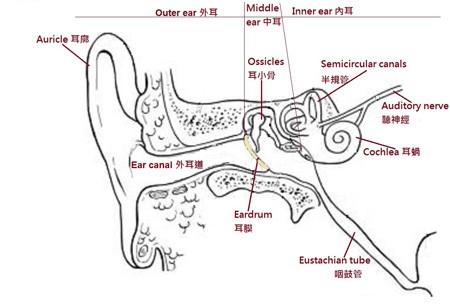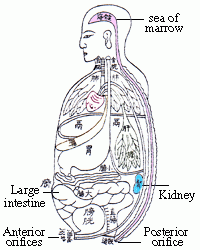Some important relationships between the ears and internal body are below:
Ear and kidney system
The ears, also known as ear orifices in TCM, rely on the nourishment of essence, marrow, qi and blood to maintain their normal functioning.
The ears are considered as the external openings of the kidney, they are closely associated with the functional state of the kidney. When the kidney is healthy, the ears can hear well. The kidney stores essence (jing), which nourishes the ears and enhances hearing. Good hearing comes with abundant of kidney essence, well-nourished sea of marrow, while kidney deficiency leads to problems like ear ringing, hearing loss, dizziness, and balance issues. This is often seen in the elderly, as the essence in the kidney naturally declines with age. Other causes of hearing problems related to kidney deficiency include excessive sexual activity, prolonged illness, or damage from certain medications. Clinically, TCM physicians often resolve these hearing problems by targeting the kidney.
Kidney stores essence (jing), produces marrow, and communicates with the brain. The kidney meridian branches out to run through the spinal cord; the Governor Vessel has a collateral to communicate with the kidney, and it runs through the spinal cord to connect with the brain; the two meridians are mainly responsible for sending essence and marrow to the ears.
Ear and heart system
According to the five elements theory, the heart belongs to fire element and the kidney belongs to water element, the two systems coordinate each other functionally. The heart rules blood and blood vessels, it also stores the spirit (shen), while the kidney governs water metabolism and the reception of qi (energy); this interaction is crucial for life activities.
TCM has a saying that “the heart opens into the tongue and is connected to the ears;” emotional disturbances can also affect ear function. Disharmonies related to the heart, such as imbalance of heart qi, heart blood deficiency, phlegm-heat disturbing heart, heart fire hyperactivate, can lead to ringing in the ears, ear fullness, ear pain, ear itching, or sudden deafness. TCM physicians often treat these conditions by nourishing the heart, calming the spirit, and using herbs to open the orifices.
Modern research supports the idea that some vascular issues such as blood vessel blockages can cause ear ringing and hearing loss. This aligns with the TCM concept of “heart blood stasis” affecting the ears.
Ear and spleen system
In TCM, the spleen and stomach are primarily responsible for digestion and absorption. They transform food and drinks into nutrient essence, and then are transported to the heart, lungs, head and eyes; the heart and lungs will make use of the nutrient essence for blood and qi productions, that further distribute throughout the body. Therefore, the transportation process in the spleen, sometimes known as “ascending pure yang,” is essential. The ears rely on this function of the spleen to receive nourishment and maintain their normal function.
A smooth process of ascending pure yang ensures a sharp hearing in the ears. When the spleen and stomach are weak, that cannot effectively ascend pure yang or produce sufficient nutrients, failing to nourish the ears and brain, it will then lead to problems like hearing loss, ear ringing or dizziness. Clinically, improper diet or excessive mental work can disrupt the harmony of the spleen and stomach, leading to ear ringing.
**The ears are also referred to as the orifices of pure yang, meaning they are located in the head where yang qi often ascends and meets.
Ear and meridian system
Most of the major meridians converge at the ears, which are associated with the functional or disease changes of internal body. In other words, the ears are closely linked to the overall health and function of the body.
Among the twelve regular meridians, the gallbladder, triple burner, stomach and bladder meridians run through the ears directly, while others either branch out or connect to the ears indirectly; the ears have extensive connections with the meridian system. The gallbladder and liver meridians are the most significant ones; the gallbladder meridian branches out to run on the lateral side of the head, circle the ear, and then enter the ear. Since the gallbladder and liver meridians are paired and have a yin and yang relationship, ear disorders are often correlated with disturbances in these two meridians. For example, ear infection or itchy ear usually indicate damp-heat irritation along the liver meridians; sudden ear ringing or deafness may indicate reverse qi flowing along the meridians. Since many acupoints around the ears are located along the triple burner and small intestine meridians, the acupoints of these two are often selected for the ear remedies. The lung meridian also branches out to reach the eardrum and can affect the hearing too. This often happens after upper respiratory infections, due to congestion near the throat.
Finally, the spleen and lungs are responsible for body fluid metabolism and distribution, disorders in the two organs may lead to fluid accumulating in the ears, hearing sense will be affected too. Clinically, this often occurs in conditions such as middle ear infection and Meniere’s disease.
To sum up, TCM regards the ears as special windows on the body surface; they should not be in an obstructed state, and need properly supported by internal organs, for example essence provided by the kidney and heart, constant ascending of pure yang by the spleen, functional regulated by the liver, and cleansing by the lungs. Ear problems cannot merely be considered as a localized issue, they can also be originated from internal body disharmonies.
According to TCM experiences, hearing problems such as tinnitus, double hearing and deafness are hard to distinguish clearly, as they tend to occur concurrently. TCM physicians usually view them as different stages of hearing declined, and their causes may be similar too. Besides ear ringing, it is necessary to know in detail about individual medical history, accompanying signs and lifestyle, and with appropriate syndrome differentiation, all of which ensure better treatment outcomes.
For ear ringing, TCM physicians diagnose a disharmony pattern for each patient, and will use it to guide the treatment plan. Below two major patterns of ear ringing are for preliminary evaluation:

 The ears are located on each side of the head, they are responsible for hearing and balance of the body. TCM considers the ears to be orifices on the body surface, acting as windows to the internal body. Their function is closely linked to the organs, and any pathological changes in the organs and meridians can reflect or affect the ears. In other words, the normal operation of the ears requires continuous regulation and nourishment by the qi and blood of internal body, hearing problems such as hearing loss or tinnitus should be considered in the context of overall health.
The ears are located on each side of the head, they are responsible for hearing and balance of the body. TCM considers the ears to be orifices on the body surface, acting as windows to the internal body. Their function is closely linked to the organs, and any pathological changes in the organs and meridians can reflect or affect the ears. In other words, the normal operation of the ears requires continuous regulation and nourishment by the qi and blood of internal body, hearing problems such as hearing loss or tinnitus should be considered in the context of overall health.

